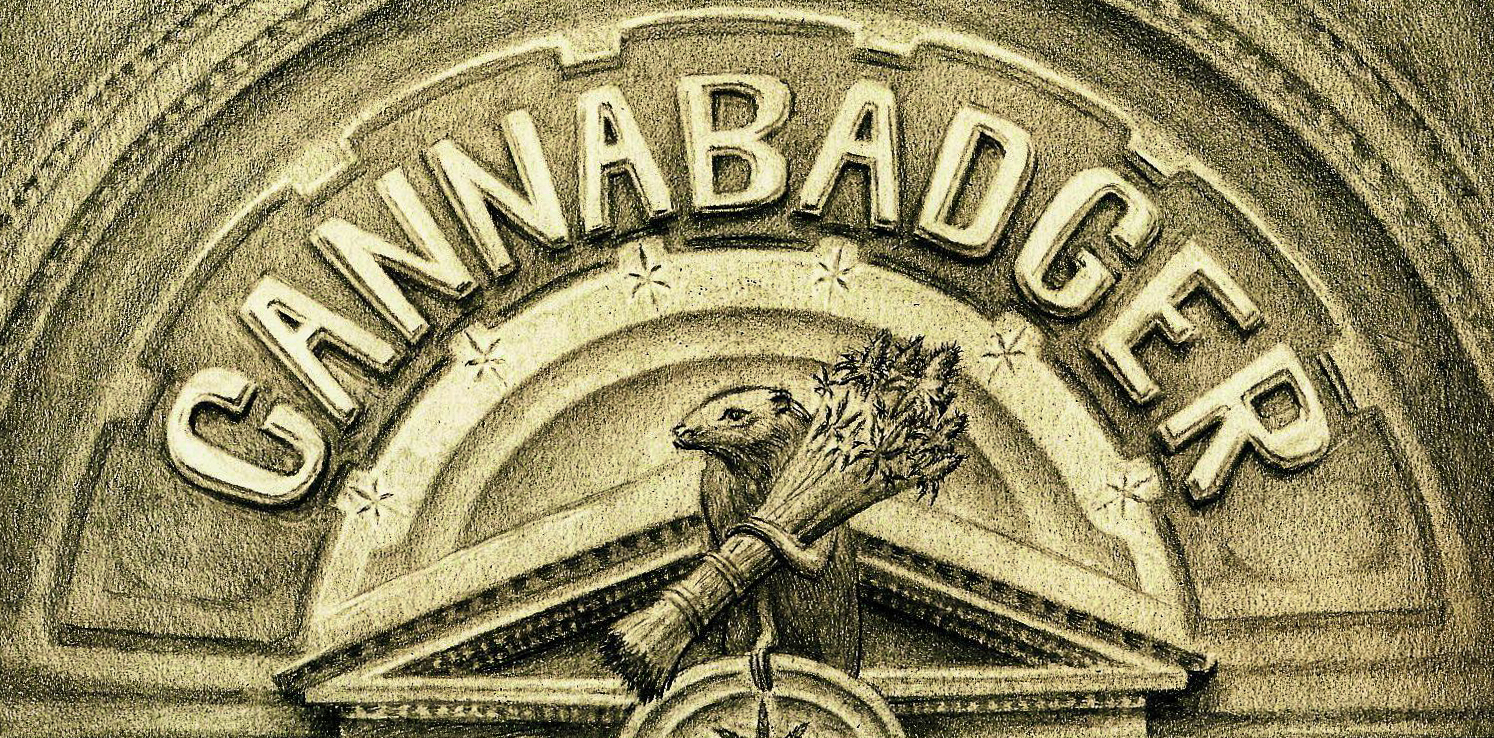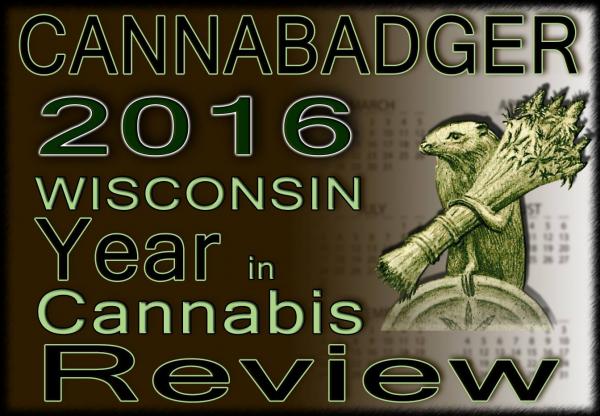2016 marked another difficult year for cannabis legalization in Wisconsin. With all branches of state government under the control of Republicans who have shown little interest in cannabis for six years and counting, progress at the state level was again stymied. With any forward progress impossible at the state level, cannabis activists once again concentrated on local efforts, with mixed results.
The city of Monona Wisconsin has fumbled attempts to reduce pot penalties badly. (Cannabadger.com)
After a state senate committee voted 4-0 to advance CBD legislation in mid-January 2016, hopes were raised that lawmakers might pass a bill that would fix issues with the bill passed in 2014. Madison NORML activists also continued an effort in Monona to reduce pot fines there that started in mid-2015, hoping to capitalize on similar moves by Fitchburg and other municipalities. Meanwhile, federal authorities filed a motion in the Menominee Tribe’s suit against federal agencies over the 2015 hemp crop destruction to dismiss the litigation.
City of Monona WI. (City of Monona)
In February, with the 2015-2015 legislative session winding down, a number of cannabis-related bills were introduced. The state assembly passed the CBD bill passed by a voice vote and the legislation was sent to the senate. The effort by Madison NORML in Monona was sidetracked in late February when the Public Safety Commission voted to table the fine reduction plan in a contentious meeting that included an alder later admitting to bullying the committee chair, in a revelation from a March open records request.
Despite successful hearings, committee votes and passage by the state assembly, CBD legislation will apparently not get a senate floor vote this session.
March 2016, Madison NORML decided to prepare a direct legislation campaign to collect the 700+ signatures required to put a binding cannabis fine reduction proposal before voters under State statute 9.20.
The 2015-2016 session saw a record number of cannabis-related bills, the bulk sponsored by minority Democrats. A last-minute move to pass the CBD bill in the final state senate session failed due to Majority Leader Scott Fitzgerald using a motion to adjourn the session as Democrats motioned to bring the bill to a floor vote. Fitzgerald blamed the move on several pot-hating conservative Republicans. One might call these cannabis-hating senators cannabigots, and Cannabadger offered a post defining that term.
Bernie Sanders, seen here at Fighting Bob Fest 2015 in Madison WI, was declared the winner of the Wisconsin Democratic primary on Tuesday April 5, 2016. (Cannabadger.com)
Wisconsin’s April presidential primary election saw cannabis legalization backer Sen. Bernie Sanders (I-Vermont) easily win the Democratic primary over Hillary Clinton, carrying 71 of the state’s 72 counties. The Capital Times published a letter to the editor I wrote, “Medical cannabis could help opiate crisis,” commenting on the ongoing opiate epidemic and how legalizing cannabis would reduce addiction and overdoses.
In a two-part series in May 2016 using state arrest statistics, Cannabadger took a look at Wisconsin cannabis arrest hot spots. Madison NORML launched a 60-day drive to put the reduced pot fine question before voters with the collection of the first signatures. In a setback for tribal sovereignty in the state, a federal judge dismissed the Menominee Nation federal hemp suit, citing the lack of Wisconsin hemp law.
Front page of Thursday June 16, 2016 Monona Herald-Independent features Madison NORML direct legislation campaign.
In June, Madison NORML’s Monona direct legislation campaign received attention from several local media spotlighting the effort.
June also saw a letter I had published in the Wisconsin State Journal suggesting the Marquette Law School Poll should ask about pot support in Wisconsin. We also took a look at who sponsored the 2015-2016 session pot bills.
July brought an effort in the central Wisconsin city of Tomah where Alder Chris King launched an effort to look at reducing local pot fines. The idea was first rejected during a council meeting that saw heated debate and hysterics from a group of local anti-cannabis zealots.
Screen grab of video clip showing Chief finishing his testimony and Judge Flock (in cutoff jeans) pushing up to testify against the proposal to study decriminalization in Tomah. (Cannabadger.com)
However, in a surprising reversal the following day, Tomah’s police chief changed his mind, with the council then okaying the creation of a committee to study decriminalization by a 5-2 vote.
In mid-July, in perhaps the most significant development of the year for cannabis legalization in Wisconsin to date, the new Marquette Law Poll did indeed ask about cannabis legalization support, finding 59% of Wisconsinites in favor..
In Monona, following setbacks in collecting sufficient signatures and running out of time, Madison NORML suspended their ballot campaign a few signatures short of the minimum. NORML is currently planning restarting the effort by again approaching city officials in January 2017. We will continue to follow that story.
Meanwhile, with the demise of issuing medical cannabis cards to residents of any state by the Oregon Medical Marijuana Program (OMMP), Wisconsin OMMP patient numbers continued to drop.
Image attribution – The420Baker.com
In August, with the U.S. presidential election rapidly approaching, we took a look back 24 years to the time Wisconsin medical cannabis patient Jacki Rickert met then-presidential candidate Bill Clinton at a campaign appearance in Osseo, Wisc. We looked at decriminalization bill author Mandela Barnes’ (D-Milwaukee) unsuccessful attempt to unseat Sen. Lena Taylor (D-Milwaukee) in the state senate primary.
Russ Feingold with Gary Storck at a 2004 fundraiser at the Majestic Theatre in Madison. (Cannabadger.com)
Also featured was a letter I had published in the Wisconsin State Journal: “Feingold should give view on marijuana.” Unfortunately, Russ Feingold didn’t take that advice and perhaps his failure to support cannabis law reform kept some voters from supporting him in his loss in an election that nationally saw 8 of 9 state cannabis initiatives pass, four medical initiatives: Arkansas, Florida, Montana, North Dakota, and four more states legalized adult use: California, Maine, Massachusetts and Nevada. An adult use initiative in Arizona lost narrowly.
Tomah Municipal Center (Cannabadger.com)
September, Cannabadger hit a milestone in publishing our 125th post, covering the first meeting of Tomah’s new Ad Hoc Cannabis Committee. We looked at a promise from Assembly Republicans that CBD Oil will be taken up in the coming 2017-2018 legislative session. Finally we looked at Democratic “rising star” Rep. Cory Mason (D-Racine), who it turns out is one of a small group of Wisconsin Democratic lawmakers who remain out of touch on cannabis.
Gov. Scott Walker was rated “D” on cannabis policy by NORML. (Cannabadger.com)
October explored at the difficult road it has been moving cannabis legalization forward in the Badger State with a post that was the year’s most popular, “Why Wisconsin can’t vote to legalize cannabis.” In more election-related coverage we talked to the founder of the new Wisconsin Homegrown Voters PAC, that supports cannabis-friendly candidates. And in continuing coverage of Wisconsin’s pot-unfriendly chief executive, we looked at NORML’s giving Gov. Scott Walker a ‘D’ rating on pot policy.
Medical cannabis supporters protest outside Madison fundraiser in 2010 for Sen. Julie Lassa’s congressional race, which she went on to lose. (Cannabadger.com)
The election on Nov. 8 brought some welcome news for Wisconsin medical cannabis patients and supporters when long-time medical pot nemesis State Senator Julie Lassa (D-Stevens Point) lost her seat to a pro-medical cannabis Republican.
In another article featuring Wisconsin cannabis history, we looked back to the November 1976 election when Madison voted to “legalize cannabis like alcohol or tobacco,” as the State Journal reported. November also brought news that a very conservative GOP Assembly representative proposing Wisconsin “take the lead in hemp production.
Finally, we also looked at comments from Wisconsin Attorney General Brad Schimel regarding medical cannabis and local decriminalization ordinances to a Milwaukee television station.
Looking ahead to 2017, will the Assembly GOP bring back the CBD repair bill, and will conservative Republicans in the state senate let it progress or block it again? Will Rep. Kremer follow up on his proposal to again make Wisconsin a leader in hemp production? How will the incoming Trump administration affect cannabis policy in the states? Who will introduce the first cannabis-related legislation of the new 2017-2018 session? Will any Democratic-sponsored cannabis bills receive a public hearing? Will local governments continue the trend of reducing pot penalties through local decriminalization ordinances? Cannabadger will try to answer these questions and more when 2017 arrives in Wisconsin. (Update: 12/14/2016 5:06:30 PM Rep. Kremer announced in a Dec. 14, 2016 press release, “Farm Bureau adopts policy on industrial hemp, Kremer ready to help ,” not only the support of the Farm Bureau but that he is attempting to schedule informational hearings on industrial hemp in both houses after lawmakers reconvene in January 2017.)

